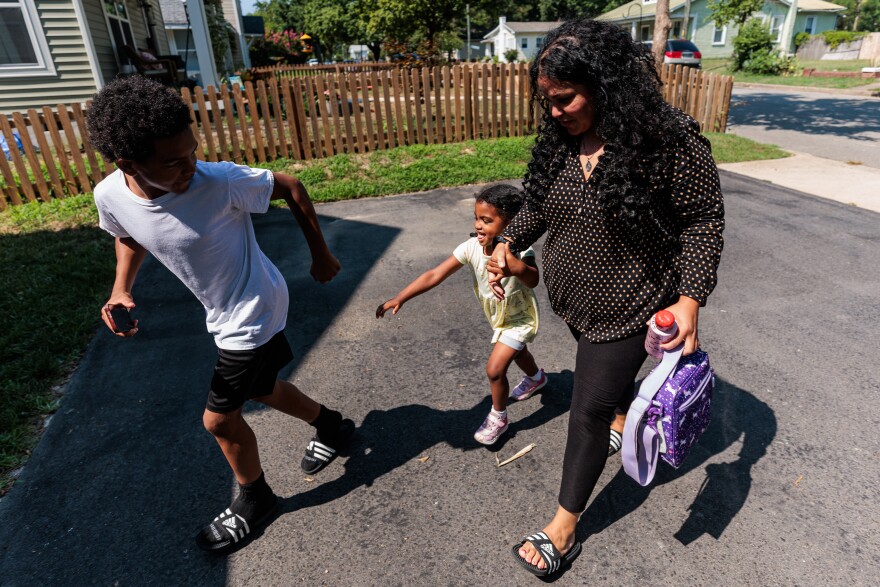Maria Small lives in Fulton and works in downtown Richmond. After her daughter was born during the COVID-19 pandemic, she struggled to get back into the working world — in part because of her day care situation. For about a year, Small was driving to and from Midlothian each day in order to get a few hours of child care.
“I still was calling around to other day cares closer to us, but the waitlist was incredibly long,” she said.
Because her daughter only had a part-time slot at the Midlothian day care, Small’s husband was also moving his work schedule around so he could help watch their baby during the day.
Reflecting back on the logistics of it all, Small said it was bananas. She was getting up at 4:30 in the morning to ensure she had time to get everything done.
“Every ounce of my day was used for something,” Small said.
A couple of times, she said, her husband questioned whether the hectic schedule was worth continuing. The cost of gas was high, and they were paying $30 in tolls each month on top of the hundreds of dollars Small had to spend on downtown parking for her job.
“Just trying to get back into the working world … it truly was a nightmare,” Small said.
Eventually, she got a call about a slot at Fulton Montessori, just down the street from her home, which became the Sprout School over the summer.
Half of Sprout School families, including Small’s, receive full or partial scholarships, while the other half pay full tuition. The mixed-income model is grounded in research that documents the benefits of socioeconomically diverse classes — not just for students, but also for staff and parents.
“We feel lucky,” Small said. “We’re grateful.”

Small said she has noticed several ways that the Sprout School has made her life easier.
She doesn’t have to pack lunches or snacks, because food is included. The hours are longer, so she doesn’t have to worry about being late to work in the morning or rushing home at the end of the day. And a mandate that Fulton Montessori parents work volunteer hours is no longer in effect.
“It’s just lightening up my load more and more,” Small said.
In addition to the new Fulton center, the Sprout School network also opened another child care center at St. Andrew’s School in Oregon Hill. Between these two centers, they’ve added over 100 slots, including some for infants.
“St. Andrew’s was in the works for so long,” said Rupa Murthy, CEO of the Richmond YWCA, which operates the Sprout School. “So the fact that after COVID we could open St. Andrew’s was a gift.”
The Sprout School network now has five locations. It opened its first location in the Richmond Children’s Museum in 2016 and its second on Bainbridge Street in Manchester in 2020.
Murthy said the Children’s Museum was the “test model” because it’s the only Sprout School without infant care. Infant care is more expensive, and there are fewer slots available across the system.
“Bainbridge was this idea of, like, if we could do the real model that would include infants,” Murthy said. “And so we went out to the community and said, ‘We need $2 million to try.’ And the community said yes.”
Other partnerships were born out of necessity during the pandemic, when day care centers nationwide were struggling to keep their doors open.
Kathleen Eastman, senior director of early childhood education for the YWCA, said Second Presbyterian Church came with questions about how the Sprout School managed to reopen after closing during the pandemic — and eventually asked if the organization would take over the church's existing child care center.
Since Second Presbyterian is across the street from the YWCA’s downtown headquarters on North Fifth Street, Eastman said the partnership “just kind of made sense,” and it reopened as the Sprout School in December 2022.
The relationship with Fulton Montessori unfolded in a similar way. The school initially reached out for help recruiting a new director — but soon realized that its model wasn’t working. Murthy said so many kids were receiving subsidized tuition that Fulton Montessori couldn’t offer fair wages and benefits to staff.
Publicly-funded waivers, Murthy said, only cover about two-thirds of the cost of providing care; the Sprout School model — which includes philanthropy and also covers full benefits for staff — is just breaking even.
“While we are very proud of our model, we know it can't sustain,” Eastman said, citing the need for a public solution to address the situation in the long term.
Despite the difficult funding situation, the YWCA has plans in the works to open at least two additional Sprout School locations over the next few years as part of larger housing initiatives with community partners.
A low-income housing development with a child care center embedded into the community is planned for Richmond’s East End, though the details are still being worked out. Another Henrico County housing campus, located near Richmond International Airport, will provide temporary housing for domestic violence and sexual assault survivors — as well as care for their children.
Murthy said they’ve raised $4.7 million out of a $19 million goal for the Henrico initiative so far.
“Henrico makes us a regional platform, and that's exciting,” Murthy said. “Every family that needs care deserves care.”













